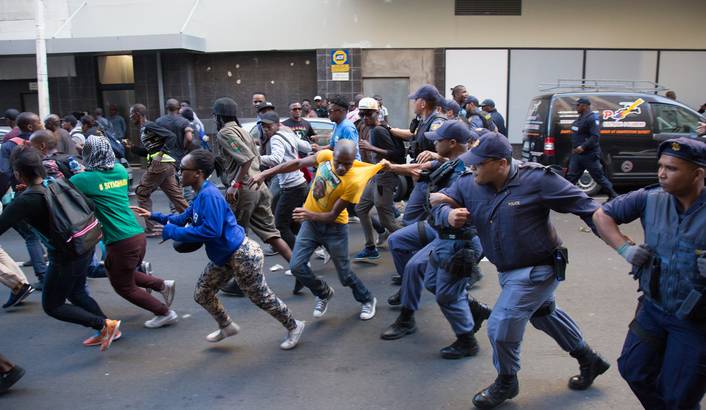As the #FeesMustFall protests are once again making headlines, recent protest activity at a number of university campuses have called into question the excessive use of force by public order police officials. In one incident on Thursday, a student who was reportedly not protesting was shot in the arm by police at the University of KwaZulu-Natal. In a separate incident on Wednesday, two students were arrested at the University of Witwatersrand. One of the students, Zainub Patel, in a video released by eNCA, alleges that she was grabbed by police offices despite protesting peacefully. While protest action began last week, protests intensified this week following Higher Education minister, Blade Nzimande’s recommendation of an eight per cent fee increase.
Speaking to VOC, head of the Urban Futures Centre at Durban University of Technology (DUT) and researcher of public order policing, professor Monique Marks affirms that given the level of violence at a number of tertiary intuitions, the response by police has been overly forceful.
She says that the use of force employed by law enforcement officials needs to be proportional to the threat that they are face with, a requirement that she asserts has not been respected in a number of incidents.
Marks says that while police are mandated to take action against any individual that is proven to be acting violently, either to themselves, property, or other people, their use of force rests at the discretion of a police commander in events relating to public order.
“We have been seeing the public order police unit on campuses. So, it must be a platoon that is sent onto campus under a platoon or section leader,” she stated.
She says that the commanding officer is vested with the duty to make the correct decisions in special circumstances. Further noting that where in a high unrest situation, offices would prepare for more violence, in a low-intensity situation, offices would act with less force.
“The students, although they have been involved in acts of violence, from what I can gather, in most of the protest have been peaceful; they are not carrying arms and are unlikely to have serious violent impact to other human beings,” she added.
In her assessment of the situation, Marks explains that the decision that has been made by commanders in charge have not been appropriate, given the level of threat that students are posing.
She further notes that it is unacceptable for law enforcement officials to enter campuses, as well as student protests with live ammunition.
“There is a whole series of mechanisms at the disposal of the police, before they enter into much more forceful engagements with crowds. They are going too quickly into high levels of force.”
While she has not spoken to law enforcement officials about the reasons for the use of force, Marks says that in her opinion, offices are attempting to apprehend individuals who appear to be “adjunct provocateurs from behind the scenes.”
She, however, notes that it has not been made clear whether or not the individuals that have thus far been arrested are in fact the “correct” individuals.
“The thing about policing student protests is that it is very public and is going to hit the news, particularly in the light of the problems around public order policing, which has culminated in the Marikana incident. I don’t [however] see that happening, but police must be more mindful.
Marks says that adding to the problem is the fact that very often students protest action is not well thought through nor are they effectively coordinated.
“I think that the students are not well guided and their own strategies are not well thought through. So, the universities that deals with these protests call the police to intervene, but are stuck as to how to operate within this variety of different dynamics,” she continued.
VOC






 WhatsApp us
WhatsApp us 

